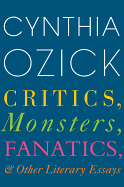
 Cynthia Ozick (Foreign Bodies) has been a brilliant and acclaimed central figure in U.S. literature for almost half a century. She begins Critics, Monsters, Fanatics, & Other Literary Essays with a manifesto on the importance of literary criticism for novelists and the general culture. Critics, she emphasizes, are key, not so much reviewers. Especially not Amazon reviewers, who "expose their insipidities to a mass audience" in a "fetid sea, where both praise and blame are leveled by tsunamis of incapacity." But a community of erudite, idiosyncratic, passionate critics can illuminate the links among books, set them in cultural and historical context, and goad the literary world toward excellence.
Cynthia Ozick (Foreign Bodies) has been a brilliant and acclaimed central figure in U.S. literature for almost half a century. She begins Critics, Monsters, Fanatics, & Other Literary Essays with a manifesto on the importance of literary criticism for novelists and the general culture. Critics, she emphasizes, are key, not so much reviewers. Especially not Amazon reviewers, who "expose their insipidities to a mass audience" in a "fetid sea, where both praise and blame are leveled by tsunamis of incapacity." But a community of erudite, idiosyncratic, passionate critics can illuminate the links among books, set them in cultural and historical context, and goad the literary world toward excellence.
"A critic is nothing without an authoritative posture, or standard, or even prejudice, against which an opposing outlook or proposition can be tested." Ozick has many of her own, and forges ahead with them in this collection of forceful, witty, thoroughly argued essays. In "Novel or Nothing," she tells of the renowned critic Lionel Trilling's frustrated ambition to become a great novelist. Her review of the collected letters of Saul Bellow becomes a tribute to his career and the strength of his legacy. She harks back to the joy of $20 season tickets to the 92nd Street Y in the 1950s, when Auden and Eliot were on the program. "It was, in fact, the Age of Poetry, a pinnacle and an exaltation; there has not been another since. Its poets were more than luminaries--they were colossi, their very names were talismans, and they rose before us under a halo of brilliant lights like figures in a shrine." In "Transcending the Kafkaesque," Ozick combines her review of an "honest and honorable" multivolume Kafka biography with a detailed repudiation of John Updike's assertion that Kafka "avoided Jewish parochialism." "To belittle as parochial the cultural surround... that bred Kafka is to diminish and disfigure the man--to do to him what so many of Kafka's stories do to their hapless protagonists." She considers the battle between realism and experimentalism, and the question of whether Holocaust fiction by William Gass and Martin Amis only veils and excuses the historical atrocities.
Ozick has her tics; "contrapuntal" is one of them, and most readers are likely to find at least one or two words she uses obscure. She would probably tell you to look them up. No one is likely to agree with everything she has to say about U.S. literature, nor should they: these essays challenge readers to form their own well-considered ideas. --Sara Catterall
Shelf Talker: A forceful and witty collection of literary criticism by a brilliant critic and novelist.

